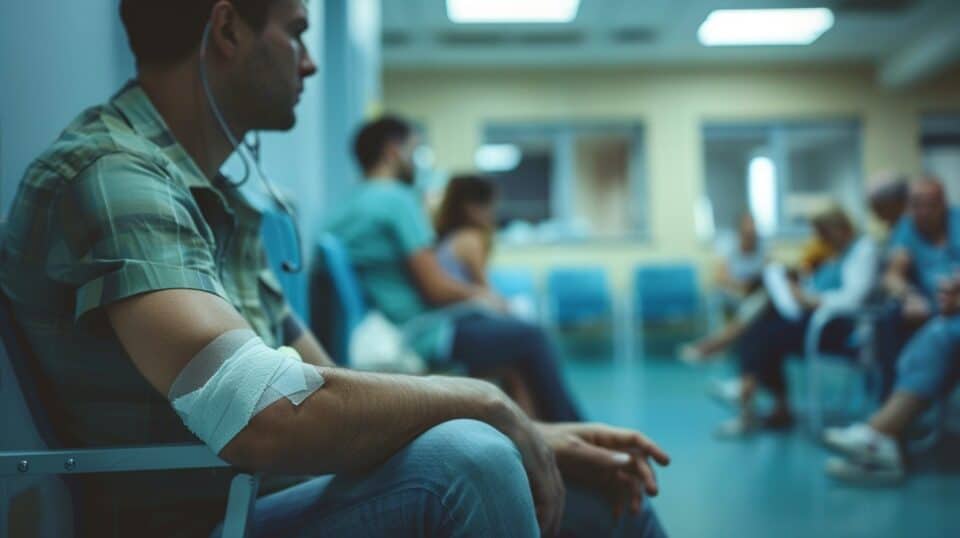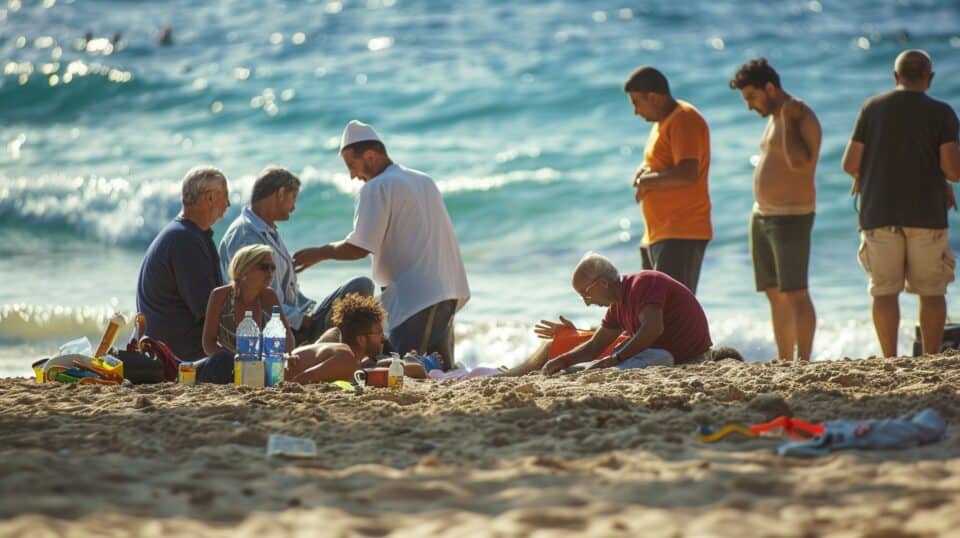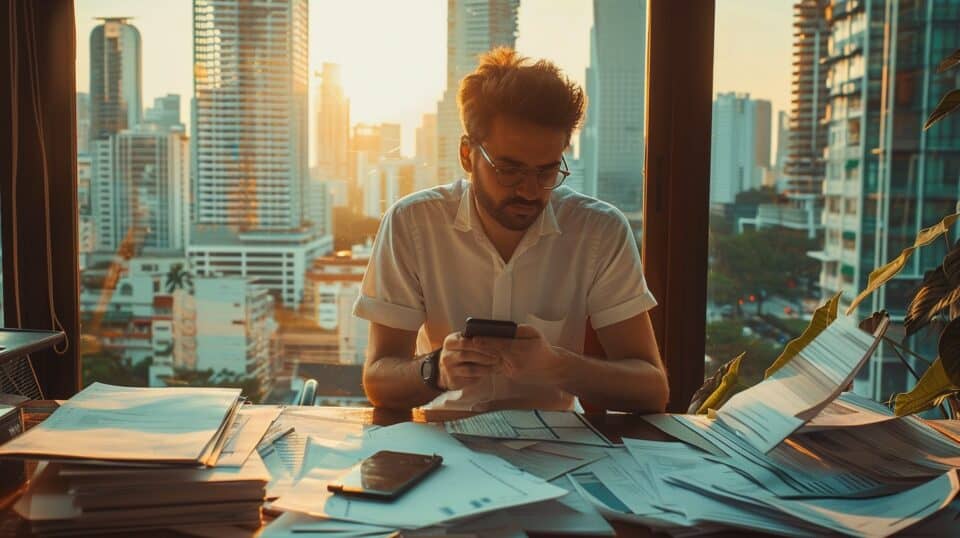Getting injured on vacation can ruin your trip fast. Every year, many travelers face this challenge. This article guides you through the steps to take if an accident happens, from emergency services to legal actions.
Keep reading for peace of mind on your travels.
Key Takeaways
If hurt on vacation, get medical help right away and tell someone in charge. This keeps you safe and starts a record of the event.
Collect all info about your injury. Take photos, save receipts, and write down what happened. This helps with insurance or legal issues later.
Talk to your travel insurance company as soon as you can. They cover some costs and guide you on next steps.
Consider talking to a personal injury lawyer if needed. They can look into who might be at fault for your injury.
Keep seeing your doctor after coming home, and stay in touch with insurance and legal teams for any ongoing needs or actions.
Table of Contents
Steps to Take Immediately Following a Vacation Injury

After getting hurt on vacation, first make sure everyone is safe and not in more danger. Then, tell someone in charge about what happened—like a hotel manager or tour guide.
Prioritize Health and Safety
Your health comes first. If you get hurt on holiday, seek medical help right away. Call 112 or 911 to reach local emergency services like hospitals and clinics where medical professionals can take care of you.
It’s crucial, especially for sudden injuries or when feeling very sick.
Next, check your travel insurance details. Insurance companies cover different things like doctor visits, hospital stays, and even getting you back home if needed. Knowing what your policy includes helps manage the situation better and ensures you don’t face unexpected bills later.
Always have your insurance information handy – in a phone or a wallet – so it’s there when you need it most.
Report the Accident
Tell the place’s boss where you got hurt. They need to know. Ask them for a written report of what happened. This paper is key for later steps, like talking to insurance or a lawyer if needed.
It makes your claim strong.
Keeping clear records from the start can make all the difference.
Document the Incident and Collect Information
Documenting your incident right away can save you a lot of trouble later on. It helps prove what happened and who might be at fault. Here’s how to do it:
- Take many photos of where the accident occurred and your injuries. This provides visual proof.
- Collect names and contact details of any witnesses. They can support your story if needed.
- Save all medical records and receipts from healthcare services you receive, as they show the impact of your injury.
- Write down everything about the accident as soon as you can. Include dates, times, and what happened before, during, and after.
- Report the incident to local authorities or the manager of the place where it happened, getting a copy of the report for yourself.
- Notify your health insurance provider about the incident to understand what costs they cover.
- According to Willie Powells, a Houston personal injury lawyer, inform your travel insurance company too because some policies offer extra protection for accidents abroad.
- Preserve any evidence like torn clothing or damaged personal items, since they can link directly to the event.
- Rising medical bills should be tracked thoroughly; everything from emergency room visits to prescriptions needs noting down.
- If involved in a car accident or similar situation, keep a record of insurance details, both yours and any others involved.
This checklist ensures you collect crucial information that might be necessary for legal proceedings or insurance claims regarding personal injuries sustained on vacation.
Medical and Legal Guidance for Holiday Accidents

When accidents happen on holiday, getting the right medical help and legal advice matters. Talk to doctors, tell your insurance, and maybe call a lawyer if things get complicated.
Obtain Immediate Medical Assistance
If you get hurt on vacation, call local help right away. Dial 112 or 911 to reach emergency services. This step ensures you get medical care fast. If in the EU, use your European Health Insurance Card (EHIC) for free or cheaper healthcare.
Always save the emergency number in your phone before you go anywhere.
Tell your travel insurance company about the injury as soon as possible. They can cover costs and offer guidance on what to do next. For serious injuries like spinal damage or if you have symptoms that don’t improve—like trouble breathing—make sure doctors know so they can provide the right treatment quickly.
Inform Your Travel Insurance Company
Call your travel insurance provider soon after the accident. Tell them what happened and ask how to file a claim. They will need details about the incident, so give them everything you have gathered.
This includes reports from local authorities or businesses and any medical records if you received care. Your insurer might also ask for photos of where the injury occurred.
Your policy may cover costs like medical bills, trip cancellations, or lost items. To make sure you get these benefits, follow their steps carefully for submitting claims.
Next up, let’s talk about consulting a personal injury lawyer to understand your rights better.
Knowing your insurance coverage details can quicken the claim process.
Consult a Personal Injury Lawyer
Talking to a personal injury lawyer is key if you’re hurt on holiday. They look into the details and tell you if you can ask for money for your injuries. Van Camp, Meacham & Newman give a free 30-minute legal chat.
This could help decide your next steps without spending money.
Thompsons Solicitors helps British families with legal advice after accidents abroad. They know about EU law, repatriation processes, and can deal with insurance companies for you.
This means they take care of the hard stuff while you focus on getting better.
Next up, keep all your important papers safe…
Managing Insurance and Essential Documents

Keep all your important papers safe, like insurance and visa details. This step is key for smooth handling after any accidents on trips. Make sure you understand what your insurance covers.
If needed, get help from your country’s office abroad. Now, learn more!
Preserve All Important Documents
After a holiday injury, keeping track of every document is crucial. These papers prove your case and help with claims.
- Save all medical records. This includes doctor’s notes, test results, and prescriptions.
- Collect receipts for any related expenses — think medicines, crutches, or even travel costs to treatment centers.
- Hold onto insurance policies. Understand what your policy covers regarding injuries and accidents abroad.
- Document communication with insurance companies. Keep emails, letters, and notes from phone calls.
- Store information about the accident scene. Photos, videos, and reports from local authorities add valuable details.
- Maintain a diary of your injury progress. Note down medical visits and how the injury impacts your daily life.
- Gather witness statements if available. They can offer another perspective on the accident.
- Secure legal documents if you consult a personal injury attorney — including contracts and legal advice given to you.
- Compile emergency calls made after the incident; phone logs can confirm timely responses to emergencies.
- Make copies of your visa and travel documents; they show you were legally in the area when injured.
Each piece connects to form a strong support for any necessary insurance or legal steps following an accident on holiday.
Clarify Your Insurance Policy Details
Keeping all crucial papers in order leads to the next step: understanding your insurance plan inside out. Know what your policy covers before you might need it. This means digging into the terms and conditions of your personal injury protection or travel insurance with medical benefits.
You should know if emergencies like food poisoning, spinal injuries, or accidents involving recreational vehicles are covered.
For example, some plans offer cash back for specific setbacks during a trip—whether that’s due to illness from trying new foods or an unexpected camper break down. Also, see if legal assistance is part of the deal, especially useful in countries where you don’t speak the language well—think about learning Spanish before heading to South America! If something goes wrong, knowing how to reach out for help makes a huge difference.
The devil is in the details – always read your insurance policy’s fine print.
Contact Your Country’s Embassy if Necessary
If hurt while on holiday, reaching out to your country’s embassy is a smart move. Embassies offer consular services that can help in emergencies. For instance, if you find yourself in a hospital abroad or facing legal issues due to the accident, the embassy staff can provide assistance and guide you on what steps to take next.
They have lists of local doctors and lawyers with experience in personal injury claims.
Make sure you know how to contact them before leaving for your trip. This includes knowing emergency numbers and having addresses of U.S. embassies or consulates handy. Also, inform them about your situation as soon as possible so they can start helping right away.
Next up: Learn how to handle insurance and essential documents after an accident abroad.
Procedures After Returning From Vacation

Once you’re back from your trip, it’s key to keep up with your doctor visits. Keep talking to your insurance and lawyer, too, to make sure everything is on track.
Continue Medical Treatment
Keep seeing your doctor. It makes sure you heal right. Your health is key, so stay on top of any treatments or check-ups needed. This includes surgeries, physical therapy, and regular visits to healthcare experts.
Sticking with your treatment plan helps avoid complications later.
Also, talk to your travel insurance company about ongoing medical costs back home. They need details about the injury and what care you are getting. This way, they can cover some expenses as per your policy terms.
Keep all medical records and receipts for insurance claims and legal needs if you think about suing those at fault for negligence.
Maintain Communication with Insurance and Legal Representatives
After you continue your medical care, it’s time to talk with your insurance and legal teams. Talking often with your travel insurance provider is key. They need updates on your health and any new facts about the accident.
This way, they can work well for you. Also, chat with your personal injury lawyer often. They guide you through legal steps and help understand complex laws.
Your lawyer will handle discussions about who was at fault in the accident. They use rules from places like Saudi Arabia or Everest Base Camp treks if needed. Your insurance company looks into how much money is needed for things like surgery or therapy after paralysis risks from accidents.
Both teams ensure you’re treated fairly, following statutes of limitations and liability laws correctly.
Evaluate the Necessity for Legal Proceedings
Keeping in touch with insurance and legal guides primes you for the next step: deciding on legal action. A solicitor can confirm if your injury was due to another’s neglect. This is critical for a strong case.
If evidence shows someone else caused your harm during your holiday, a lawsuit might be right.
Talking to a personal injury lawyer will give you clarity. They know holiday injury laws inside out. The lawyer will look at all the details of your case. Then, they’ll advise if suing makes sense or not.
This decision depends on proving that another person’s actions hurt you. If this proof exists, going to court could get you compensation for damages suffered on your vacation.
People Also Ask
What should I do first if I get hurt on holiday?
Seek medical attention right away, even for minor injuries. Use your travel insurance or credit card benefits to cover costs. Then, report the incident to local authorities and your insurance company.
Can I ask for help from my country’s embassy if injured abroad?
Yes, diplomatic missions like embassies offer help in emergencies. They guide you through local medical systems and communicate with folks back home.
Should I document my injury and how?
Absolutely, take photos of your injuries and where you got hurt. Keep all medical records and receipts… they’re key for insurance claims or legal advice down the line.
How do Brexit changes affect my rights if injured in Europe?
Brexit may change how you receive care in EU countries, so check updates from the Foreign & Commonwealth Office before traveling… Stay informed about your health coverage abroad.
When is it necessary to consult a lawyer after an accident on vacation?
If someone else’s mistake caused your injury—like a hotel’s lack of maintenance—you might need legal counsel to understand personal injury laws and seek compensation.
Is there a time limit to take legal action after an accident happens on holiday?
Yes, statutes of limitations apply—often ranging from one to three years depending on where the accident happened… Don’t wait too long; gather evidence and consider consulting a lawyer soon after getting better.



